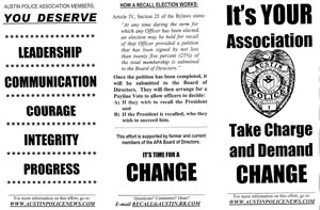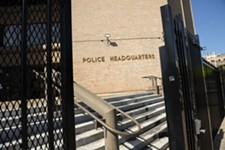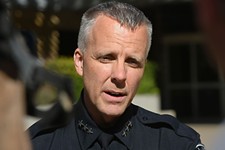An Underground Effort to Recall APA's Sheffield
Anonymous cops accuse the union head of falling down on the job
By Jordan Smith, Fri., May 28, 2004

Last month, copies of a yellow trifold brochure proclaiming, "It's YOUR Association: Take Charge and Demand CHANGE," began circulating among the membership of the Austin Police Association. According to the brochure – unsigned, but apparently produced and/or supported by "former and current members" of the APA's board of directors – union members have been hosed by three-term President Mike Sheffield. And now, a band of officers has taken to the streets, aiming to collect signatures from 25% of the union membership in order to force a general recall election.
At press time, it was unclear whether the recallers have obtained enough signatures. But even if the petition drive is successful, it is even less clear whether the recall question will ever be put before the entire union. The APA's bylaws governing recall procedures are vague and conflicting – so much so that it's uncertain whether the recall provisions are even enforceable. Before recalling Sheffield, the union may first have to recall its bylaws – or, potentially, take the ouster effort to district court.
In general, the brochure paints Sheffield as a poor communicator who lacks integrity and has failed to "support" the union's members. Some of the allegations leveled at Sheffield are somewhat addled – for example, the brochure suggests that Sheffield was derelict by not "warning" or "preparing" the membership in advance of the Statesman's dismal four-part series on police use-of-force, even though Sheffield supposedly knew of its impending publication. (Of course, without knowing the content of the series beforehand – a practice we assume the Statesman does not engage in, despite the public outing earlier this year of editorialist Arnold Garcia's alleged reportorial quid pro quo with Mayor Will Wynn – it's hard to imagine what kind of warning Sheffield might have offered.) Under a section titled "lack of integrity," Sheffield is charged with reporting APA Secretary Sgt. Jason Dusterhoft to APD's Chief of Staff Rick Coy for "inappropriately" using his city e-mail account to send other officers a story from the AustinPoliceNews.com Web site, challenging the veracity of former Assistant Chief Jimmy Chapman and others on the Fifth Floor. According to the brochure, Coy subsequently opened a "major investigation" of the incident. The e-mail affair likewise made it into the pages of the Statesman, which, the brochure charges, "damaged" Dusterhoft's reputation.
Dusterhoft could not be reached for comment, but Sheffield said the brochure's account of the incident leaves out several important points. The union's labor contract forbids APA members from using city e-mail accounts to conduct union business, he said, and three board members brought copies of the Dusterhoft e-mail to Sheffield, concerned that the cop-shop brass would view the e-mail as official union business. "I told [Coy] that the APA is in no way responsible for this since we'd already been told not to use city computers for APA business," he said, "and since we'd already been threatened more than once by Assistant Chief Chapman that he was going to sue all the people spreading lies about him." (According to Sheffield, Chapman made that threat in mid-2001, shortly after Sheffield called for an independent investigation into the infamous mid-Nineties drug trafficking investigation code-named Mala Sangre.)
Moreover, Sheffield said, Dusterhoft isn't the only board member who has received an official knuckle-rapping for similar misuse of city e-mail. Indeed, APA Vice-President Wuthipong "Tank" Tantaksinanukij received a reprimand after using city e-mail to forward a Chronicle article to other cops. "The point is that these were not APA-sanctioned things," Sheffield said.
Whether the allegations have merit may take a back seat to whether the APA's bylaws actually contain a viable provision for conducting a recall election. At issue are two sections – Article IV, Sections 24 and 25 – which, theoretically, outline all the recall rules. Section 24 calls for any recall effort to be vetted and approved by the union's board, and provides a protocol for the general recall election, while Section 25 provides for a member-driven petition effort, with no mention of the board or any election protocols. Nowhere do the bylaws mention whether the two provisions are simultaneous or independent.
The way Sheffield and his supporters read it, whether initiated by petition or by the board, any recall effort must first comply with Section 24 before an election can be called. Without the benefit of specific charges vetted by elected representatives, Sheffield said, a recall effort could be used as retaliation – the same kind of behavior that the union opposes in the workplace. Others close to the effort disagree. Under an alternate interpretation of the bylaws – apparently the interpretation at play in the current recall attempt – Section 25 is meant to stand alone, and is a way to take the question directly to the general membership.
APA General Counsel Tom Stribling declined to comment for this story – understandable since he is, at least for now, in the unfortunate position of having to advise union members on both sides of the effort. Still, there are obvious problems with each interpretation. Under Section 24's requirement that the APA board itself vote to approve a recall election, Section 25's populist petition provisions become superfluous. But if Section 25 is meant to be completely independent from Section 24, then it borders on unenforceable, since it doesn't contain rules regarding how and when an election would be called.
This isn't the first recall effort aimed at ousting Sheffield. In April 2001 (coincidentally also right after the city and union signed off on a new labor contract), Officer Sam Bryson charged Sheffield with "willful neglect of office" for failing to consult APA membership before sitting on the city's Police Oversight Focus Group – the panel that ushered in the current era of civilian oversight. Bryson's challenge failed, with just three board members in support – the same number that voted to support this year's recall drive. But, Sheffield said, at least during the 2001 go-round, everyone knew who was unhappy and why, which in his view is not the case this time. "Attempts have been made by several board members who've asked the questions, who wrote this [brochure], who produced it, who is the author of the recall? And [they] were met with absolute silence," Sheffield said, "which I think speaks volumes about the veracity of the contents, when no one wants to take any responsibility for it."
Got something to say on the subject? Send a letter to the editor.










